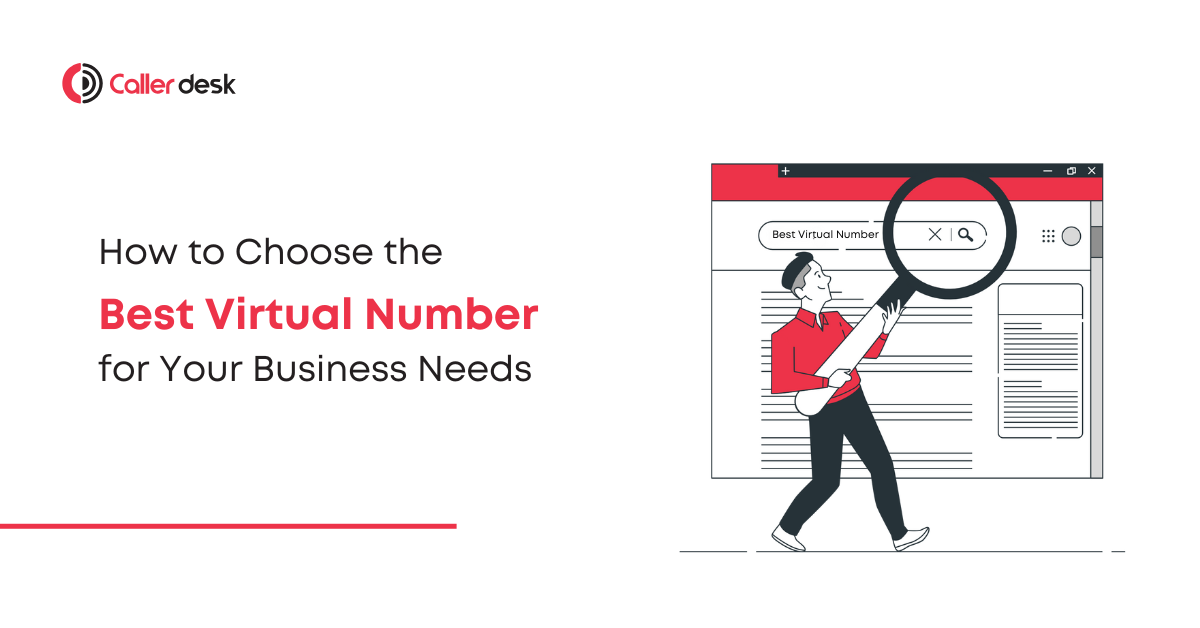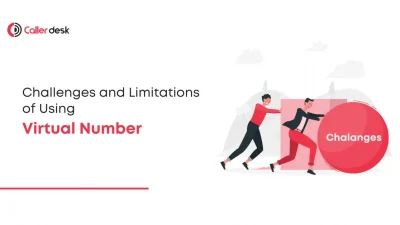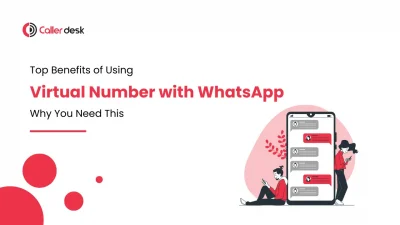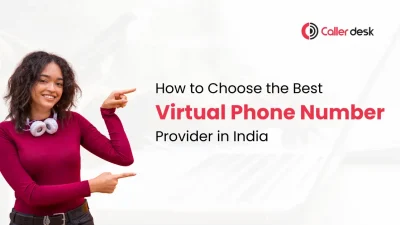Every missed call is a lost opportunity. Every delayed response can push a customer away.
If your business struggles with inefficient communication, high call costs, or unorganized customer interactions, you’re not alone.
But there’s a simple solution—a virtual mobile number.
Whether you’re a startup, an e-commerce business, or a growing enterprise, the right virtual mobile number can streamline communication, improve customer experience, and even boost conversions.
This guide will walk you through everything you need to know to choose the best virtual mobile number for your business.
1. Define Your Business Needs
Before selecting a virtual mobile number, you need clarity on your business requirements. Without a clear purpose, you might end up with features you don’t need or miss out on critical ones.
Key Questions to Ask
- Do I need this number for voice calls, SMS, or OTP verification?
- Who is my target audience—local, national, or global customers?
- What features do I require—call routing, IVR, call recording, SMS integration?
Checklist to Define Your Needs
- Do I need multiple numbers for different regions or departments?
- Will I use this for customer service or marketing campaigns?
- Does my business need 24/7 call handling capabilities?
Example
A Bengaluru-based SaaS startup used a toll-free virtual number during product launches, giving customers a free and easy way to reach support. This boosted engagement and improved customer trust.
2. Research and Compare Virtual Number Providers
Not all virtual mobile number providers offer the same reliability, features, or pricing. Choosing the right one requires proper research.
What to Look for in a Virtual Number Provider
- Reviews and Ratings – Check customer feedback on platforms like Trustpilot and G2.
- Security Measures – Ensure they offer encryption, secure data storage, and compliance with data privacy laws.
- Customer Support – Test their responsiveness before making a commitment.
Recommended Providers
- CallerDesk – Best for advanced features, transparent pricing, and great customer support.
- RingCentral – Ideal for businesses needing global reach and CRM integration.
- Grasshopper – Simple and user-friendly for small businesses.
Example:
An e-commerce store in Delhi chose CallerDesk after verifying its strong customer reviews and seamless integration capabilities with their existing CRM system.
3. Evaluate Key Features
A good virtual number is more than just a phone number. It should come with features that improve efficiency, reduce costs, and enhance customer satisfaction.
Key Features to Consider
- Call Recording – Helps with quality control and staff training.
- IVR System – Guides customers to the right department without human intervention.
- Call Routing – Ensures calls are answered by the right person, improving response time.
- Analytics and Reporting – Tracks call data, missed calls, and peak hours.
- SMS Integration – Essential for OTPs, customer notifications, and promotional campaigns.
Why These Features Matter
- Better Customer Experience – IVR and call routing reduce waiting time.
- Data-Driven Decisions – Call analytics help businesses optimize staffing and customer service.
Example:
A real estate agency in Hyderabad implemented call recording to monitor agent performance and improve response quality, increasing customer satisfaction by 25%.
4. Compare Pricing Plans
The cheapest option isn’t always the best. You need a balance between affordability and value.
How to Compare Plans
- Subscription Fees – What’s included in the base cost?
- Feature Inclusions – Are key features like call routing and analytics part of the package?
- Scalability – Can the plan grow as your business expands?
Tips for Better Pricing Deals
- Ask about annual discounts to lower costs.
- Negotiate extra features like free SMS credits or advanced analytics.
Example
A marketing agency in Jaipur opted for a pay-as-you-go plan. This allowed them to scale usage during peak marketing seasons without overpaying when call volumes were lower.
5. Test the Service Before Committing
Most virtual number providers offer free trials or demo versions. Always test before committing.
What to Test
- Call Quality – Are calls clear and stable?
- SMS Delivery Speed – Do OTPs reach customers instantly?
- Integration Compatibility – Does it connect smoothly with your CRM or software?
Example
An edtech company in Hyderabad tested multiple providers and selected the one with the fastest OTP delivery, ensuring students had a smooth login experience.
6. Prioritize Security and Compliance
If your business handles customer data, security should be a top priority. A trusted provider should follow strict security protocols.
Must-Have Security Measures
- Encryption – Protects call and message data from unauthorized access.
- Compliance – Ensure adherence to GDPR, CCPA, and India’s IT Act.
- Multi-Factor Authentication – Prevents unauthorized logins.
Example:
A healthcare app in Kolkata selected a virtual number provider compliant with GDPR to securely handle patient inquiries and protect sensitive data.
7. Plan for Future Growth
Your business communication needs will grow as your business expands. Choose a virtual mobile number provider that offers flexible, scalable solutions.
Why Scalability Matters:
- Regional Expansion: Add local numbers as you grow into new markets.
- Team Growth: Add lines for new departments without switching providers.
Example:
A tech startup in Delhi started with a single virtual number for customer support. As they expanded, they added numbers for regional offices, enhancing local accessibility while maintaining a unified system.
Conclusion
Choosing the right virtual mobile number is one of the smartest decisions you can make for your business.
With the right provider, you can streamline communication, improve customer engagement, and enhance business growth.
If you want a solution that’s secure, scalable, and cost-effective, it’s time to make the switch.
Get started today and transform your business communication with CallerDesk.
Frequently asked questions
1. What is a virtual mobile number, and how does it work?
A virtual number is a phone number that operates through the internet rather than a physical SIM or landline. Calls or SMS sent to the virtual number are routed to devices like mobile phones, desktops, or CRM systems.
2. Can I use a virtual mobile number for OTP verification?
Yes! Many businesses use virtual numbers for reliable OTP delivery, ensuring secure logins and transactions.
3. Are virtual mobile numbers expensive?
Virtual numbers are cost-effective, with providers offering flexible pricing plans. They eliminate the need for physical phone systems, reducing infrastructure costs.
4. Can virtual mobile numbers handle both calls and SMS?
Absolutely! Virtual numbers can handle voice calls, SMS, and even advanced features like call routing and IVR.
5. Are virtual numbers secure?
Reputable providers prioritize security with encryption, secure data storage, and compliance with regulations like GDPR and CCPA.
6. How do I choose the right provider?
Focus on providers offering robust features, transparent pricing, strong customer support, and positive reviews. CallerDesk is an excellent choice for businesses of all sizes.
7. Can I scale my virtual number usage as my business grows?
Yes! Virtual numbers are highly scalable, allowing businesses to add new numbers or upgrade features as needed.





